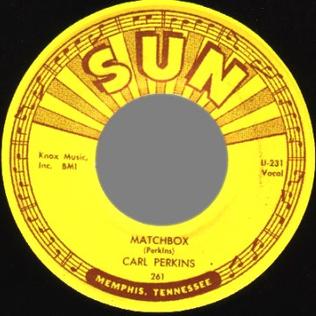Related Research Articles

Herman "Junior" Parker was an American blues singer and harmonica player. He is best remembered for his voice which has been described as "honeyed" and "velvet-smooth". One music journalist noted, "For years, Junior Parker deserted down home harmonica blues for uptown blues-soul music". In 2001, he was inducted into the Blues Hall of Fame. Parker is also inducted into the Mississippi Musicians Hall of Fame.

"Matchbox" is a song written and recorded by Carl Perkins and released in 1957. Blind Lemon Jefferson wrote and recorded a song entitled "Match Box Blues" in 1927, which is musically different but which contains some lyric phrases in common.
Country USA was a 23-volume series issued by Time-Life Music during the late 1980s and early 1990s, spotlighting country music of the 1950s through early 1970s.
Contemporary Country is a 22-volume series issued by Time-Life during the early 1990s, spotlighting country music of the 1970s through mid 1990s.
Jesse James became a hero in folklore and dime novels before he was killed in 1882. A manifestation of this was the emergence of a wide body of music that celebrates or alludes to Jesse James.

Moses George Hogan was an American composer and arranger of choral music. He was best known for his settings of spirituals. Hogan was a pianist, conductor, and arranger of international renown. His works are celebrated and performed by high school, college, church, community, and professional choirs today. Over his lifetime, he published 88 arrangements for voice, eight of which were solo pieces.
"Motherless Child Blues" is the name of two distinct traditional blues songs. They are different melodically and lyrically. One was first popularized by Robert "Barbecue Bob" Hicks, the other by Elvie Thomas.
The third season of the Theme Time Radio Hour premiered on Wednesday, October 8, 2008, the same week that saw the release of a new edition of the Bootleg Series, Tell Tale Signs. Somewhat eerily, given that it aired during the week of a worldwide financial crisis caused by the collapse of the credit markets, the first show's theme was "Money: Part 1".
"Down by the Riverside" is an African-American spiritual. Its roots date back to before the American Civil War, though it was first published in 1918 in Plantation Melodies: A Collection of Modern, Popular and Old-time Negro-Songs of the Southland, Chicago, the Rodeheaver Company. The song has alternatively been known as "Ain' go'n' to study war no mo'", "Ain't Gwine to Study War No More", "Down by de Ribberside", "Going to Pull My War-Clothes" and "Study war no more". The song was first recorded by the Fisk University jubilee quartet in 1920, and there are at least 14 black gospel recordings before World War II.
"Milk Cow Blues" is a blues song written and originally recorded by Kokomo Arnold in September 1934. In 1935 and 1936, he recorded four sequels designated "Milk Cow Blues No. 2" through No. 5. The song made Arnold a star, and was widely adapted by artists in the blues, Western swing and rock idioms.

The Enrique Iglesias & Jennifer Lopez Tour was a co-headlining concert tour by Spanish singer Enrique Iglesias and American entertainer Jennifer Lopez. It began on July 14, 2012 in Montreal and concluded on September 1, 2012 in Miami. The trek was presented by State Farm and was promoted by AEG Live and followed the end of Iglesias's Euphoria Tour and the beginning of Lopez's Dance Again World Tour. Puerto Rican duo Wisin & Yandel was to be the opening act of the tour, but they dropped out weeks before the tour was set to begin, due to "unresolvable issues".

The Bob Dylan Gospel Tour was a concert tour by American singer-songwriter Bob Dylan that consisted of 79 concerts in North America in three legs, lasting from November 1, 1979 to May 21, 1980.
George W. Williams was a vaudeville performer and recording artist in the United States. He recorded several songs with Bessie Brown his wife. They were one of the comedy duos on the TOBA circuit.

Bob Miller was an American songwriter, recording artist, A&R representative, and publisher.
References
- ↑ Ralph Rinzler, quoted in Erbsen 2003 , p. 118.
- ↑ Josh Beckworth, Always Been a Rambler: G.B. Grayson and Henry Whitter: Country Music Pioneers of Southern Appalachia, (2018)
- ↑ "Going Down This Road Feeling Bad" http://www.csufresno.edu/folklore/ballads/LxU072.html
- ↑ Folksinger's Wordbook (Oak Publications: 1973), p. 60 (accessible on Google Books)
- 1 2 3 "My Heart's in the Country: Skeeter Davis: Songs, reviews, credits". AllMusic . Retrieved 21 September 2022.
- ↑ Davis, Skeeter (May 1966). ""If I Had Wheels"/"If I Ever Get to Heaven (I Won't See You)" (7" vinyl single)". RCA Victor . 47-8837.
- 1 2 Whitburn, Joel (2008). Hot Country Songs 1944 to 2008. Record Research, Inc. ISBN 978-0-89820-177-2.
- ↑ Unterberger, Richie. "Skeeter Davis Biography". AllMusic . Retrieved 20 September 2022.
- 1 2 3 Davis, Skeeter (September 1966). ""Goin' Down the Road (Feelin' Bad)"/"I Can't Stand the Sight of You" (7" vinyl single)". RCA Victor . 47-8932.
- ↑ "Skeeter Davis Chart History (Hot Country Songs)". Billboard. Retrieved September 22, 2022.